By Jamie Tahana, RNZ News Te Ao Māori journalist at Waitangi, and Russell Palmer, digital political journalist
Iwi leaders in Aotearoa New Zealand have accused opposition parties National and ACT of “fanning the flames of racism”, urging the prime minister to be brave and not walk away from partnership on Three Waters.
With Waitangi events and festivities gearing up for the holiday weekend, Prime Minister Chris Hipkins attended the Iwi Chairs Forum yesterday.
He emerged from the closed-doors meeting saying they had asked the government to continue to work with Māori “to advance the issues that we’ve been working on previously”.
Iwi leaders had also, it seemed, laid down a wero [challenge].
“I have also heard their concern that they don’t want to see ethnicity, race, being used as a way of dividing New Zealanders and I was able to absolutely reiterate my government’s commitment to ensuring that we continue to work together to avoid that happening,” Hipkins said.
“Where there is uncertainty, where there is a lack of clarity, that can lead to fear. Politicians who use that fear or exploit that fear in order to try and gain political advantage need to really reflect on their own actions. That’s something my government will never do.”
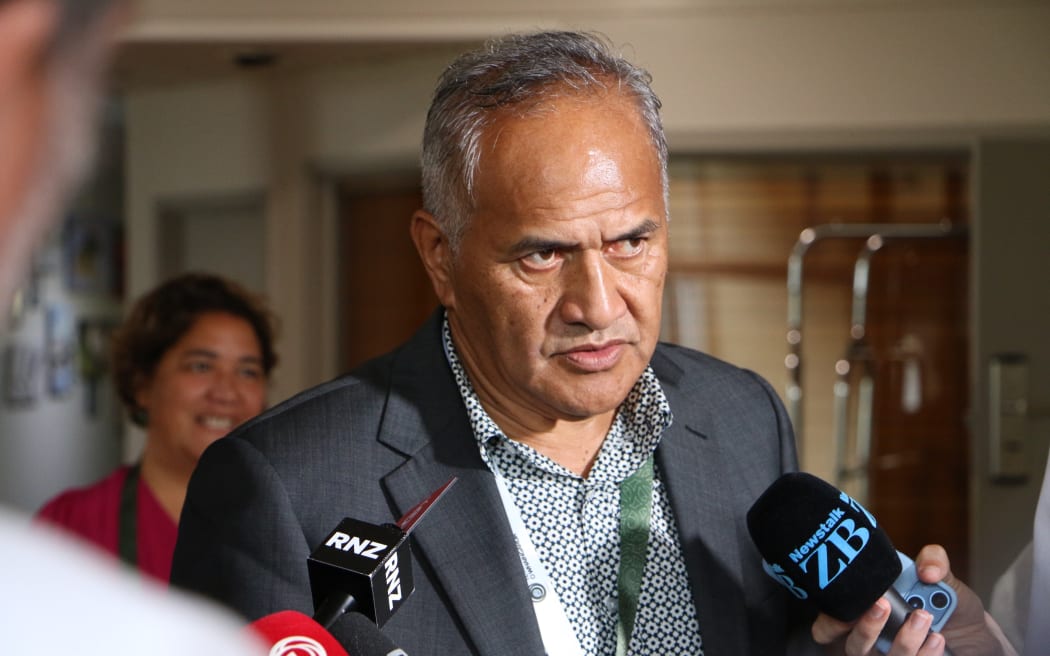
He was not afraid to get into specifics, either.
“They don’t want the concept of co-governance to be used to stoke fear, and nor do we,” he said.
“I think it’s been misunderstood and those who seek to use misunderstanding around it for political advantage need to reflect on their own behaviour.
“People can form their own judgments about that but I certainly think the opposition — National and ACT have, as they’ve done in the past — they’ve used uncertainty to try and stoke fear.”
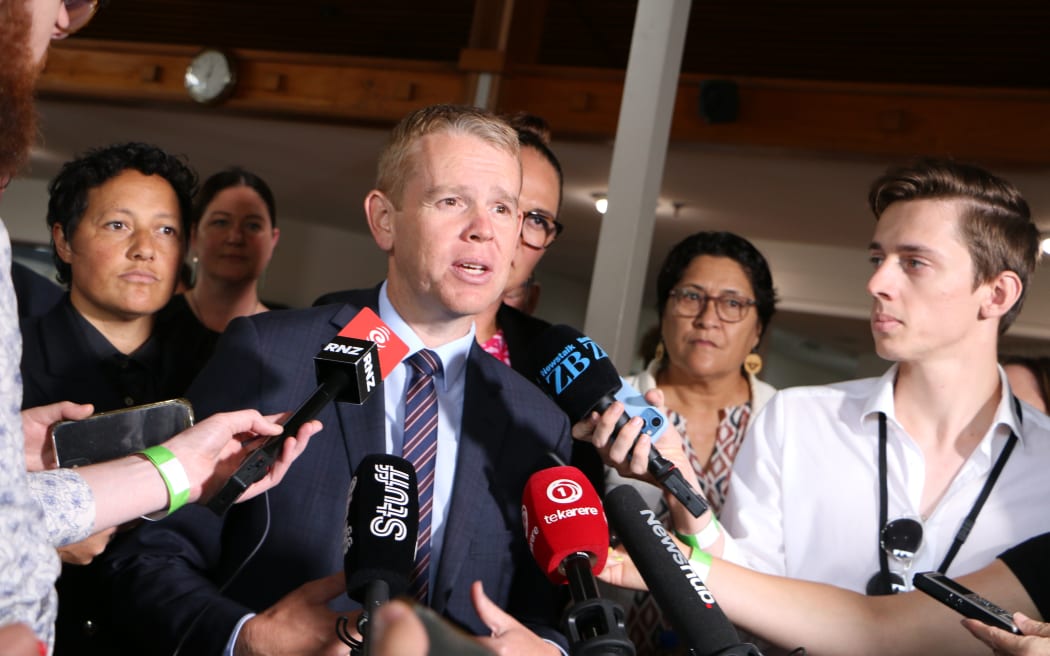
The devastating flooding in Auckland this week may have changed some minds about the need for change in management of drinking, waste and stormwater — something Hipkins will be looking to capitalise on.
“I think that we have to accept that as a result of climate change we’re going to see more extreme weather events, and stormwater — which is an integral part of the Three Waters system — is going to continue to come under more pressure,” he said.
The iwi leaders were not shy about it either, with Tukoroirangi Morgan telling reporters they wanted co-governance or a similar partnership retained in the Three Waters legislation.
“The challenge we’ve put to the prime minister today is will he succumb to the attack dogs of the National party and ACT as they fan the flames of racism and anti-Māori sentiments, and throw us under the bus for the sake of keeping alive Three Waters?”
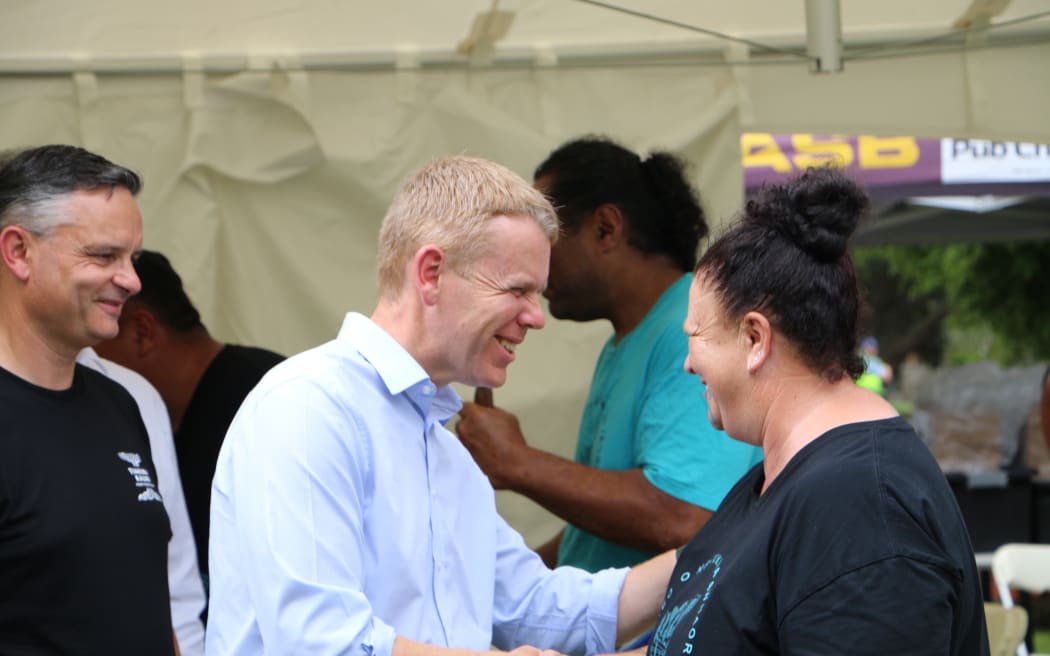
Morgan, it must be noted, has been appointed chair of the entity set to oversee Auckland and Northland’s water.
“There is nothing mysterious about Three Waters — it’s all about pipes under the ground. Our view is as it has always been: we stand here at Waitangi, the cradle of the Treaty of Waitangi, and here is the embodiment of partnership,” he said.
“What we seek from this government is an ongoing commitment that partnership will amplified and affirmed through Three Waters, [it is an] opportunity for the Crown and Māori to work together in a meaningful and significant way.”
Jamie Tuuta, an iwi leader from Taranaki, also warned against allowing Māori to become a political football this election.
“One of the key messages we want to give to the prime minister and other ministers is that they need to stand up, they need to step up,” he said.
“It’s unacceptable — because again, the racist and biased attacks on Māori in 2023 are unacceptable.”
A Pou Tikanga of the forum, constitutional law expert Professor Margaret Mutu, said it was essential race rhetoric was removed from electoral debate.
“There’s a need to understand and address racism in this country and over recent times it’s got a lot more urgent,” Professor Mutu said.
“We need to make sure that work doesn’t slow down, particularly as the extreme attacks coming in are very, very hurtful. We want to try and stop that hurt.”
Te Arawa’s Monty Morrison said the meeting went “very well, it was very open.”
Ngāti Kuri’s Harry Burkhardt said they “were clear about our message, and I think Chris received that well”.
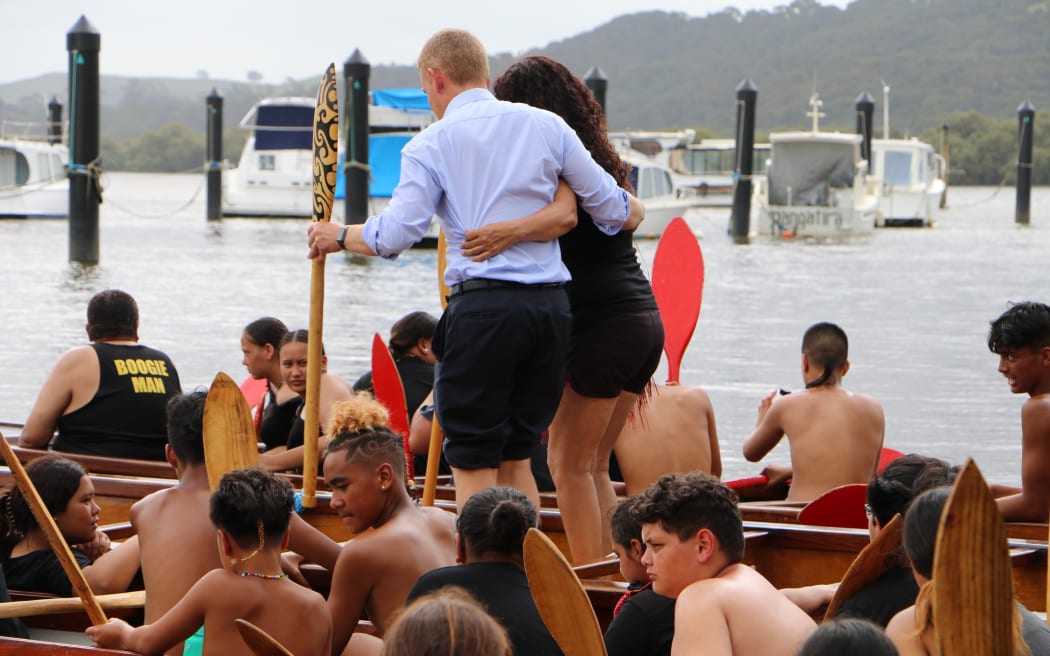
Luxon, Seymour respond
Co-governance was a topic National’s leader Christopher Luxon chose to address when he visited Rātana last week. His speech accused the government of failing to make its position on the matter clear, and allowing it to become a “divisive and immature” conversation.
National had been invited to meet with the Iwi Chairs Forum but declined. In a written statement after the kōrero at Waitangi today, Luxon said the party had been clear about its position.
“We support co-management between government and Māori for natural resources in the context of Treaty settlements. We do not support co-governance of public services or separate bureaucratic systems for Māori and non-Māori,” he said.
“Labour has progressed a divisive agenda and continually failed to set out its views clearly. It is disappointing to see the new Prime Minister try to shut down the discussion rather than clearly setting out Labour’s plans for the public to judge.”
Luxon has previously raised as examples National does not support:
- The Māori Health Authority, which sets strategy for overcoming racial health gaps and commissions kaupapa Māori health services
- The Three Waters legislation allowing equal representation between council and iwi appointees on a strategic oversight group which appoints the management board of the four entities set to take over management of water services
ACT leader David Seymour — who has Ngāpuhi roots — has been even more stridently critical of these, arguing they are race-based approaches which only further divide.
“If the prime minister thinks that ACT is making co-goverment divisive, wait till he hears what Labour’s been up to,” he said.
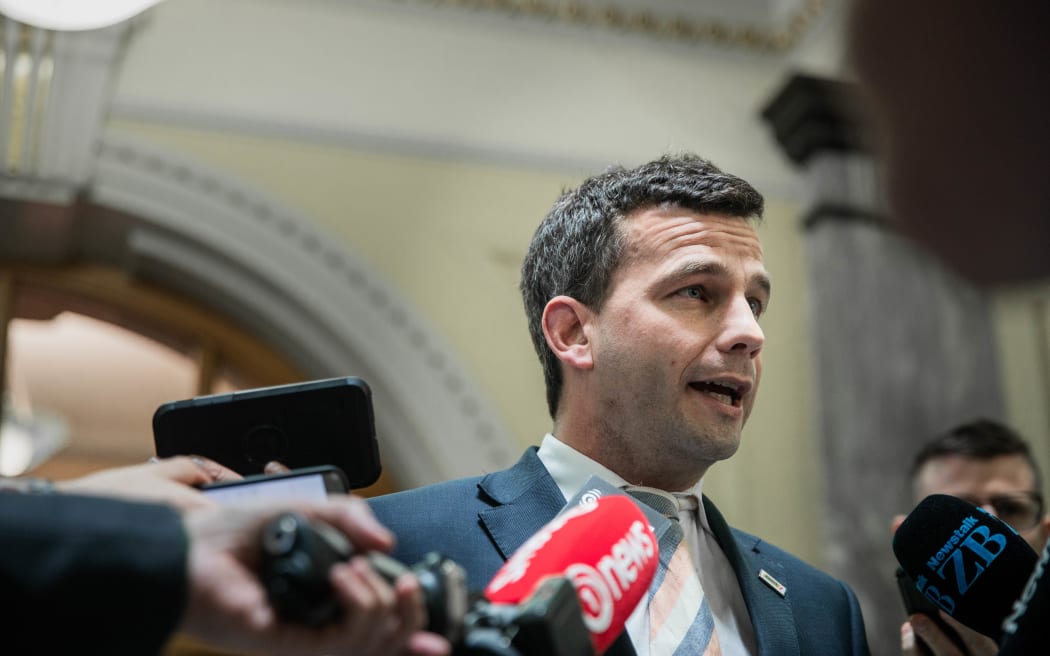
“Their modus operandi is to divide public affairs between two groups of people based on race — that is divisive and it’s unsurprising that opposition parties are raising concerns.”
He bristled at being labelled an “attack dog” by Morgan.
“Again, it’s a shame. The Iwi Chairs Forum were an organisation we’ve enjoyed good relationships with.
“That kind of language, calling people dogs, well it doesn’t exactly sound like they’re coming to the table to make the situation any better, now, does it.”
Three Waters changes yet to be decided
Since taking over as Prime Minister from Jacinda Ardern, Hipkins has promised his government will focus more on the “bread-and-butter” issues, targeting cost-of-living pressures and cutting back some of the government’s work programme.
Media speculation has highlighted the unpopularity of the government’s RNZ-TVNZ merger and the Three Waters projects, and therefore likely on the chopping block.
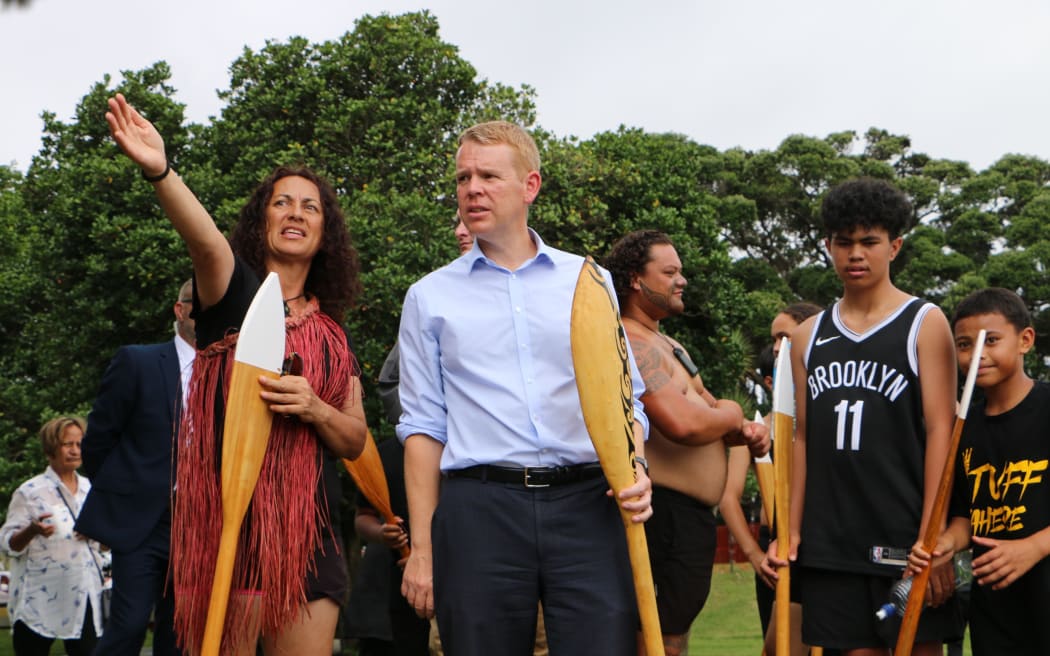
Hipkins signalled announcements within weeks about the slimmed-down work programme, but when pressed about Three Waters early this week spoke about the need to change the status quo — statements he repeated today.
“We’ve been doing so many different things, actually we probably haven’t created the space to make sure people understand what we’re doing and why we’re doing it and that is absolutely, I think, a lesson for us over the last five years and it’s something we have all reflected on and you’ll see some change in that regard.
“I haven’t said a lot in terms of ruling things in and out, but one thing I will rule out is no reform . . . we can’t continue with the status quo — it is not delivering New Zealanders the water services they need and that they deserve.
“If we leave it just with the status quo, one thing it will deliver is significantly higher rates for households, and I’m not willing to just stand back and say ‘that’s a council problem to deal with’.”
He has, to date, refused to outline what any of the changes to the project might be — saying those decisions are yet to be made by the full Cabinet — but speculation has centred on the co-governance aspect.
“I think everybody acknowledges that what we’re doing now or around the way we manage our water infrastructure in New Zealand is not sustainable, and it has left us with a pretty disgraceful legacy, frankly, of that core infrastructure being run down.”
Taranaki iwi leader Jamie Tuuta said whatever changes came, they expected the same level of engagement and partnership.
“By and large what we ask is that we are respected and that [Hipkins] and his ministers engage openly with us in the event that there are any changes.”
With an election in October, Morgan and the other leaders present at today’s forum are clear: they want bold leadership and partnership, and however this year’s election plays out — they will still be there.
“This is a ongoing journey for us,” Morgan said. “Absolutely, we would want a very clear and unfettered response and commitment from this government that they’re not going to walk away, nor are they going to throw us under the bus for their own political means.
“Iwi will be at this side of the table come the election, we’ll deal with whoever the government is. What is clear in this situation is we are enduring, iwi will remain as the Treaty partner.
“Whether we deal with Hipkins after the election or the National Party, we will see, but all we say is that we want an equitable share in the major decisions that affect our people – that’s our bottom-line expectation.”
This article is republished under a community partnership agreement with RNZ.
Iwi leaders warn Hipkins not to bow on Three Waters co-governance https://t.co/upsPqJEbMm
— RNZ News (@rnz_news) February 3, 2023
This content originally appeared on Asia Pacific Report and was authored by APR editor.
APR editor | Radio Free (2023-02-03T23:06:10+00:00) Iwi leaders warn Hipkins not to bow over Three Waters co-governance. Retrieved from https://www.radiofree.org/2023/02/03/iwi-leaders-warn-hipkins-not-to-bow-over-three-waters-co-governance/
Please log in to upload a file.
There are no updates yet.
Click the Upload button above to add an update.